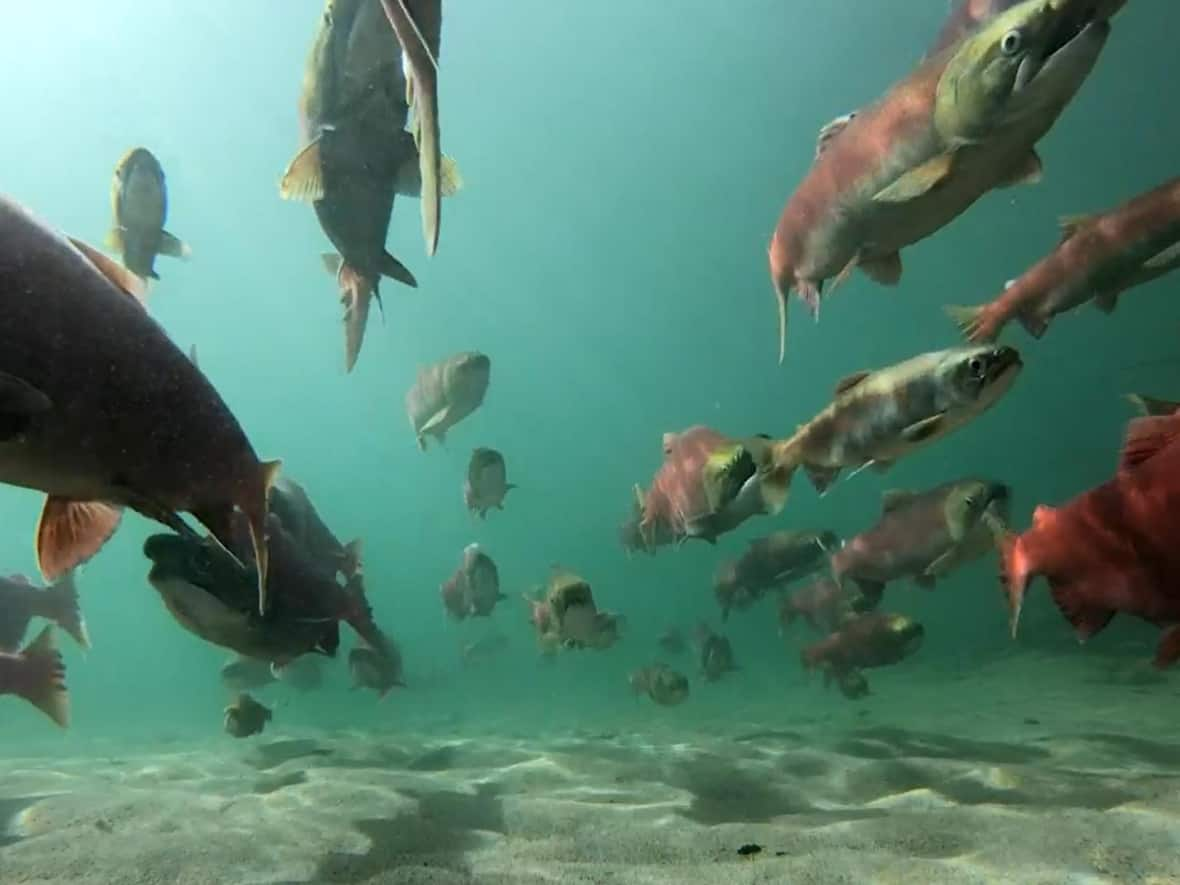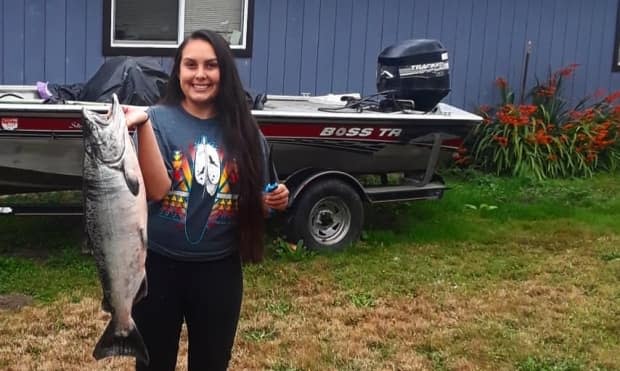Pacific Coast Indigenous nations see a glimmer of hope for the future of salmon

Brook Thompson grew up along the shores of the Klamath River in Northern California, where her family would spend their summers camping and catching salmon.
"It's where I got a lot of connection about my culture and my family history," said Thompson, 27, a member of the Yurok and Karuk tribes, to Unreserved host Rosanna Deerchild.
The Klamath River, which flows from Oregon through Northern California and is part of the Yurok and Karuk traditional territory, once provided a bountiful supply of salmon in its cool, clear waters. But since 1918, salmon populations along the river have been declining and habitats have disappeared as six hydroelectric dams were built.
In 2002, when Thompson was seven, she witnessed the most devastating fish kill in the history of her people. According to a report from the U.S. Fish and Wildlife Service, 34,000 salmon died. The cause of death was a parasite able to spread through the warm, stagnant water, due in large part to the low flow from a nearby dam.
"I remember specifically holding my mom's hand and walking along the rocky shore of the Klamath River by the mouth, and just seeing piles and piles of dead salmon lining the shore," Thompson said. "I didn't understand why all these beings had to die and how they could be alive the day before and dead the next morning."
Along the Pacific Coast of Turtle Island, many Indigenous nations carry a deep spiritual connection with salmon they share territory with. Many call themselves the salmon people. But threats like habitat loss, climate change and human development from hydroelectric dams and fish farms have meant salmon are disappearing from the waters.

Indigenous nations say the loss of salmon has led to the loss of spirit, culture and overall health of their people. But as salmon continue to shimmer through the routes their ancestors once swam, the Pacific salmon people have a glimmer of hope.
That's because efforts are underway from parts of British Columbia down to Northern California, where Indigenous people are working to rebuild habitats and remove human development so the salmon might be saved for future generations of people and fish alike.
"It's not only about having the salmon, it's about teaching the Indigenous values and what it means to be a tribal member," said Thompson.
Hard-fought victories
There are five species of Pacific salmon — Chinook, Chum, Coho, Pink and Sockeye — and it's estimated that Salmon stocks in almost all areas are at historic lows. In B.C., former fisheries minister Bernadette Jordan said last year that some stocks are seeing up to 90 per cent declines.
But the shíshálh First Nation along the Sunshine Coast in B.C. is celebrating a recent victory for their people and the salmon.

In November, fish farm giant Grieg Seafood announced its two remaining salmon farms in the shíshálh territory would be decommissioned this winter.
The announcement came after the First Nation, with provincial assistance, decided not to renew their operating license. In 2019, B.C. became the first province to implement the United Nations Declaration of the Rights of Indigenous Peoples, which requires governments to obtain free, prior and informed consent before taking actions that affect Indigenous Peoples and their lands.
"It is actually quite remarkable for us because we've been saying it all the way along that we weren't consulted," said hiwus (Chief) Warren Paull of shíshálh First Nation.
Fish farms in B.C. waters have long been linked to the spread of pathogens among wild fish, including salmon. Studies in 2011 and 2017 also found young sockeye salmon from B.C.'s Fraser watershed are infected with higher levels of lice after swimming past sea farms. Young salmon infected with parasitic lice grow more slowly, which makes them more vulnerable.
Paull said fish farms aren't all to blame, but the farms add to the cumulative effects salmon are facing from climate change and oxygen depletion in the ocean. And he worries about the orca, eagles, bears, coyotes and wolves who also rely on the salmon to live.

"The net detrimental effect is pretty devastating and affects the whole cycle of life."
Moving forward with the removal of the commercial fish farms from their territory is one less obstacle for the salmon, but Paull says more work will need to be done to bring back the population.
"We want to pass this on to the next generation, the generation beyond that and the generation that hasn't yet to be born. We want to make sure it's in as good a shape as we got it," he said.
WATCH | Questions about fish farm sea lice study:
'If there's no salmon, then life is not fully life'
In southwestern B.C., people are restoring inland salmon tributaries.
In the fall of 2021, Kerrie Charnley took part in a four-day trip to help with rebuilding streams and planting native flora of the Upper Pitt River that had been decimated from a B.C. Hydro dam in the Alouette River, which is a tributary to the Pitt River.
Katzie First Nation led the restoration project in partnership with World Wildlife Fund Canada.

"As West Coast Indigenous people eating the salmon, they've had an impact on our DNA," Charnley said. "It's such an intimate connection and reciprocal with the salmon."
The Pitt River is a large tributary home to all five species of Pacific salmon, according to World Wildlife Fund Canada. It feeds into the mighty Fraser River — the longest in the province.
Before Charnley arrived, someone else had already carved out the riverbed with machinery to create tributaries for the salmon to come spawn. It was sunny out, and Charnley noticed some flickers on the water.
"There were little fish in there, and the biologist who was with us confirmed that, yes, they were salmon, and we were just like, 'how did these salmon get there already'?"
She said the restoration project was a transformative experience.
"When I think about those baby salmon in that puddle, I think we need to protect and take care of the environment for them," said Charnley.
"If there's no salmon, then life is not fully life."
WATCH | B.C.'s vital salmon run:
Tearing down the dams
For Thompson, in Northern California, the 2002 fish kill was a turning point in her life, she said.
She studied engineering, public policy and environmental studies to bring Indigenous knowledge into those sectors to inform engineering and infrastructure development.
"People don't want to see the complexity of the damage that these dams can cause just because they're considered a renewable resource," she said.
After the fish kill, several tribes along the Klamath River began the fight to have the dams removed. In November, the U.S. Federal Regulatory Energy Commission approved the removal of four of the six hydroelectric dams along the Klamath River — it will be the largest dam removal and salmon restoration project in history.
It will return the lower half the river to a free-flowing state for the first time in more than a century, according to the Associated Press.
"[It's] something people have been fighting for over the last 20-plus years," Thompson said.
She recalled what one of her uncle's grandmother's used to tell him: that the best salmon you can ever have is the one you never taste. It's the salmon that you give away to an Elder, or to someone who can't catch it themselves, and watching their joy as they eat it.
"And I want my kids and my grandkids to experience that same feeling of joy," she said.


